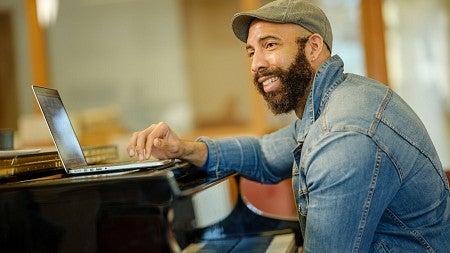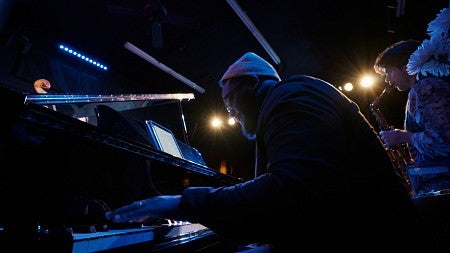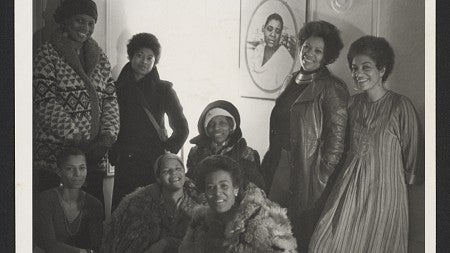
Nathan Harris and “The Sweetness of Water”
With a nudge from his creative writing professor, Harris authors a first novel of critical acclaim before turning 30
By Matt Cooper • Photo by Laurel Sager • January 19, 2022
5 min readNathan Harris had written what he felt was a clever little story—he had given the narrator this “very out-there voice,” he recalls—and he presented it to creative writing professor Jason Brown with satisfaction. Brown read for a few minutes, and then a wry smile crossed his face. “This is a fine story,” he told Harris, “but it isn’t you.”
“He hit the nail on the head,” says Harris, BA ’14, recalling the exchange years ago in Brown’s intermediate fiction class. “Finding your voice as a writer is hard. He guided me toward my voice.”
Following Brown’s advice, Harris—then an undergraduate English major—concentrated instead on the sweeping tale that was almost writing itself in his head: a Civil War-era story of slave brothers at the moment of the Emancipation Proclamation, an expansive account that pulled Harris into exploring the deep waters of race and racism, power, love, and homosexuality.
Upon reading Harris’s early working pages, Brown knew he was holding something special. “I saw fantastic writing that was the beginning of a long project, and all I did was encourage him,” he says. “I could see flame there.”
That flame became The Sweetness of Water, a novel of critical acclaim accentuated by the fact it is Harris’s first, written before he turned 30. He credits Brown and the creative writing program for helping him commit to an epic undertaking that one reviewer described as “unwriting Gone with the Wind,” destroying phony representations of romanticism and race.
Blending historical fiction and a cast of rich, complex characters, Harris tells the story of two freedmen and a Georgia farmer who forge an alliance that alters their lives forever. Running parallel to their relationship is a forbidden romance between two Confederate soldiers, all set against the backdrop of a violent, prejudiced town.
Published last March, The Sweetness of Water quickly became a New York Times bestseller and was declared “miraculous” by the Washington Post. It’s an Oprah’s Book Club pick and a recommendation on former president Barack Obama’s favorite books of 2021 list. The novel was longlisted for the Carnegie Medal for Excellence and the Booker Prize, one of the world’s most prestigious literary awards.
“Nathan Harris is, plainly, one of the most exciting writers I’ve read in years,” says award-winning author Elizabeth McCracken, whose work has been published in the Best American Short Stories and the New York Times Magazine.
Harris had known since childhood that he wanted to be a writer, and he has always been drawn to bold, profound works—among them, The Known World (Edward P. Jones), Cold Mountain (Charles Frazier), and Beloved (Toni Morrison).
But the talented student who took creative writing at the UO and was accepted into the Kidd Tutorial Program—an intense, yearlong immersion in the craft—lacked the confidence to see himself as a novelist.
Amid the rigors of the instruction, this changed. In committing to the relentless discipline of putting words on a page day after day, week after week, Harris found his literary voice emerging. In animated, small-group meetings with other students, he read the work of his peers and learned to identify and deliver the same constructive feedback so valuable to his own growth.
“You’re constantly working—you’re reading the other students and you’re learning what works and what doesn’t work,” Harris says. “You just learn how a story operates.”
Long talks with Brown and other faculty members proved invaluable.
The creative writing program is structured to free up teachers for substantial one-on-one time with students to help them come into their own as writers, Brown says, regardless of their stage of development. Discussions might center on fundamentals like grammar and syntax or more nuanced topics such as voice, theme, and character development.
Harris, who went on to win the program’s Kidd Prize for fiction, had a “fast apprenticeship,” Brown says. “I could see right away that this guy was getting better at a faster pace than normal people.”
The two talked at length about form: Brown writes short stories, but it was clear Harris was drawn to longer projects, to “climbing those big hills,” Brown says, and his encouragement inspired Harris to pursue his Civil War story as a novel.
“We just sort of hit it off,” Harris says. “His door was always open to me. The whole writing department couldn’t have been more welcoming.”
As the novel took shape, Brown helped Harris assess the pros and cons of a career as a writer. Regarding the writing itself, however, he was emphatically hands-off. “You don’t want to throw any wrenches in there,” he says. “You don’t want to interrupt the process when they’re still conceiving the project—that can be deadly. I didn’t want my voice in his head. I just said, ‘Finish it.’”
From 2013 to 2015, Harris worked on the novel mornings and evenings while delivering food for an online service. After graduation he was accepted as a fellow at the Michener Center for Writers at the University of Texas at Austin, where he completed the project.
Harris values historical fiction and the exploration of past themes that still resonate today, so it was important in The Sweetness of Water, he says, to “do justice to the period.” At the same time, however, he wanted to avoid an exhaustive recreation of the Civil War era so he could focus on an evocative, human story with richly drawn, relatable characters.
Consider young protagonists Prentiss and Landry, freedmen and brothers. While they bear the cruel scars of slavery—whippings have left the powerful Landry mute—they’re also siblings through and through, teasing, pestering, and occasionally disappointing one another, all within the context of an ironclad reciprocal devotion. George Walker, the aged white farmer and their unlikely partner, is similarly multidimensional: courageous and idealistic, a devoted husband who is intimate with a prostitute, a flawed, regretful person hoping to leave behind just one truly meaningful contribution. Perhaps like anyone.
“I want to create complex humans on the page who are engaging with one another on a deep level that makes them feel real to the reader and empathetic to their plight,” Harris says. “Empathy is the most important element to reading a novel. And writing one.”
Matt Cooper is managing editor of Oregon Quarterly.




